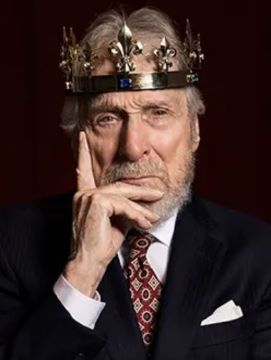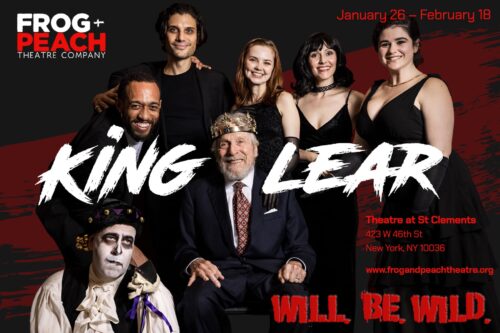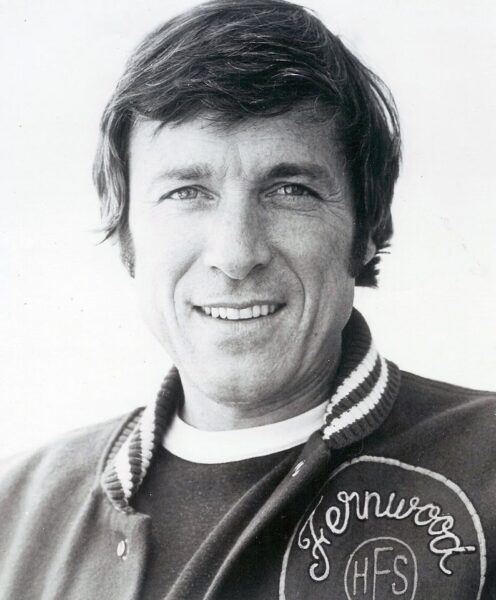KING LEAR, KING LEAR
Gregory Mullavey stars in the Frog + Peach Theatre Company’s production of Shakespeare’s King Lear through Feb. 18, 2024. Mr. Mullavey performs the iconic tragic character who, nearing the end of his reign, challenges his three daughters in a most unusual way to determine who will reign over his kingdom.
Mr. Mullavey has acted in more than 100 plays from Broadway to Los Angeles. On Broadway, he starred in Romantic Comedy opposite Mia Farrow and Tony Perkins, in Rumors opposite Veronica Hamel, and in Joe DePietro’s Clever Little Lies opposite Marlo Thomas. Also, he appeared in The Soap Myth at The National Jewish Theater Foundation and in Final Follies at The Cherry Lane Theatre. In Los Angeles, he performed in Chekhov’s The Cherry Orchard opposite Alfred Molina, in The Road Theatre Company’s Merchant Of Venice as Shylock, and in East LA Classic Theatre’s Much Ado About Nothing as Leonato. At the Guthrie Theater, he starred in The Price, in Alaska’s Light Opera Theatre I Do, I Do, in Calgary, Canada Tale Of An Allergist’s Wife, and in Miami at The Coconut Grove in Jake’s Women. Mr. Mullavey has also starred in numerous movies and TV shows including the iconic classics Mary Hartman, Mary Hartman, Bob and Carol and Ted and Alice, Gunsmoke, Big Valley, Centennial, and iCarly.
Stage and Cinema’s Gregory Fletcher recently spoke with Mr. Mullavey in Morningside Heights where both reside.
Gregory Fletcher: I read in your bio that you played King Lear 25 years ago at the Center Theater in Oklahoma. How has recreating the role today been different from the first time around?
Greg Mullavey: A very candid one word answer to that: age. I don’t memorize as well as I used to, and I hadn’t picked up the script in the 25 years since. But when this opportunity came up and I decided to do it, the themes of ageism really impressed upon me. My daughters in the play talk about it, as well as Lear himself in the very first act. He has the line, “…’tis our fast intent / To shake all cares and business from our age, / Conferring them on younger strengths, while we / Unburden’d crawl toward death.” He knows his years are numbered and that he’s getting older and having issues of age. I have maladies now that I’ve never had before. Infirmities. My memory isn’t as good as it used to be. I’ve had to ask for line a few times in performance. That’s never happened to me before.
Eric Doss as Fool and Greg Mullavey as King Lear (Maria Baranova)
FLETCHER: Did you have the typical four weeks of rehearsal?
MULLAVEY: No, less. Maybe three and half weeks, but not full-time, and which included tech, which proved to be more time-consuming than expected. We never had a full run through till our first performance in front of an audience. When I did the role before, we rehearsed for seven weeks, six days a week, seven hours a day.
FLETCHER: And you were 25 years younger with, I’m sure, more energy.
MULLAVEY: Yes, so you see, there have been many issues that have pushed many of Lear’s issues my way. In that sense, I have a lot more insight into the role than I ever had as a younger man, 25 years ago. I have a lot of energy for an older person, but what I’ve discovered is this: I need to eat more before a performance in order to have the energy to carry me through to the end. Taylor Swift has told people — and my doctor knew this — that in a three-hour performance she would run out of gas. She wasn’t eating enough before going onstage. And neither was I. I’ve learned that lesson now. That correlation has been very helpful to me in performing this role once more — meaning the actor sustaining a performance, not the energy of Lear himself. I understand that Kenneth Branagh, who’s currently playing the role in the West End, has gotten criticized for having too much energy as Lear. We’ll see. I hear he’s bringing the production to New York at some point in the future.
King Lear (Maria Baranova)
FLETCHER: Does the play state how old King Lear is?
MULLAVEY: No — just he’s old. Stated by my daughters. And by me. I say, “Dear daughters, I confess that I am old. Age is unnecessary.” And later, “You see me here, you Gods, a poor old man, as full of grief as age; wretched in both!” There’s very much acknowledgement of his old age and the trials that come with it.
FLETCHER: Are you comfortable telling your age? Because I’ve found a couple different numbers online.
MULLAVEY: Well, I’m not really comfortable with it because it makes me feel too exposed. But I’ll tell you this: my age on IMDB is not right. But that’s not my fault. The damn system won’t allow the person who pays for it to be in control. They won’t let me correct it. I’d have to hire a hacker. My wife is much better at it than I am, but she can’t do anything about it either.
King Lear (Maria Baranova)
FLETCHER: Well, whatever your age, I loved your first entrance onstage when I saw a preview because it really felt that King Lear had entered the building. You were the real deal. King Lear present.
MULLAVEY: Did I call for line?
FLETCHER: Only once in Act I. A couple times in Act II.
MULLAVEY: If I get the wrong cue, I get confused. I should be able to handle it — and normally I do, but Shakespeare is harder. You can’t improvise with King Lear unless you can do it in iambic pentameter. The actor playing Gloucester [David Elyha] is pretty good at it. He’s done a lot of Shakespeare. I’ve done only four Shakespeare plays in my life. I played Shylock in The Merchant of Venice, Leonato in Much Ado About Nothing, and Lear twice. I’m not a Shakespearean actor in the usual sense of the word. I mean, I wasn’t classically trained, although I’ve been taking classes for years with different teachers based on Lee Strasberg and the Meisner techniques.
King Lear (Maria Baranova)
FLETCHER: I read that Frog + Peach actually came out of the Actors Studio with the mission of producing Shakespeare. Are you part of the Actors Studio?
MULLAVEY: I’m not. I could’ve been, but … I went to the Studio to try it out, but there was too much criticism, I thought. And the people criticizing, I didn’t really respect. It just didn’t feel right for me. I found another workshop in L.A. Even now, I’m still training. Learning more. It’s an ongoing never-ending process.
FLETCHER: Did Lynnea [Benson] direct with an Actor Studio approach or was it a typical approach to Shakespeare?
MULLAVEY: Yeah, in the sense that her background is a member of the Actors Studio, I’m sure it influenced her. I’m not sure if she studied directly with Lee Strasberg — maybe she met him, I’m not sure. But from what I recall about the Actor Studio approach is that they started from an interior place. Emphasizing more emotional stuff at first. Though Lynnea’s approach pushed us to give a performance quality to our work from the very start of rehearsal. Projecting out and emphasizing the technical parts of the work — using the voice and training that muscle. It’s very demanding, but I found it very helpful in the end. Lynnea is a New Yorker; she went to Barnard. We’re all so acclimated with Sanford Meisner, Stella Adler, Lee Strasberg and all those great acting teachers back in the day. It’s how we work. You know, what do I want in the scene? Why? Blah blah blah. It’s my relationship with these people, etcetera, etcetera. We’ve all studied with people who taught this approach. There’s a mix of all of that today. Lynnea’s approach is rooted in that too. What are you doing in the scene? What are you wanting to see? Also, she gives examples from her own life about what’s going on in the scene. And what’s interior. And what you should try to do.
But now, she’s more about, “You gotta carb-load.” Like Taylor Swift. She’s worried because I fell during a show last weekend, and she put the understudy on until I saw a doctor. Which I did, and that’s when we discovered I wasn’t eating enough to give me the gas I needed to get through a performance. All my tests are fine, but she’s cautious because if something happens to me onstage, she’ll feel responsible and would never forgive herself if I collapsed onstage and died. But it could happen to any of us.
Greg Mullavey in Frog + Peach's Titus Andronicus (Lee Wexler)
FLETCHER: And what a way to go. Collapsing onstage seems like an ideal way for an actor to pass over. No, maybe backstage is better after a final exit.
MULLAVEY: I told her the same thing. If I’m gonna go, I’m okay with it. She said, “Don’t make jokes like that.” Okay, okay, I thought. Hopefully, she’ll speak with my doctor and get the thumbs up, and I’ll be back onstage soon. [Since this interview, Mr. Mullavey is indeed back in the show.] I feel bad for my understudy. He’s very good — a terrific, wonderful guy — a very good actor, but we’ve all had little rehearsal, and he went on with the script in hand. It’s unfair to him and the audience. The role is daunting, even the director describes it like climbing Mount Everest, and she’s right.
FLETCHER: Have any of the current politics or politicians influenced your interpretation of King Lear?
MULLAVEY: Donald Trump, I guess. More from the director than from me because she wanted a jerk at the beginning of the play. Someone more Trumpy and narcissistic who doesn’t really understand his daughters at all. I’m not sure I saw it that way exactly because I don’t see it in the text. I’m proud of my daughters and think I’ve produced these powerful women, especially the youngest one who he thinks will be queen one day. That’s what he had in mind. And then she fails him miserably because she won’t play along in the formality of the court, which is a bunch of posturing. People pretend they’re noble, kind, and wonderful — and altruistic — but they’re not. She doesn’t want to play that game and, of course, he loses it. He knows he’s losing it and goes off on her. He tries to regain his faculties but once you give away power, it’s hard getting it back.
Abigail Rose Solomon with Greg Mullavey in The Last Sedar
FLETCHER: Did you act onstage in Buffalo?
MULLAVEY: No, I was born there but after six years, I was raised in nearby Jamestown, about 75 miles south. My dad was a baseball player for the Buffalo Bisons. Prior to, he played for the Chicago White Sox. And then the Red Sox — the Boston Red Sox. Then he went to Buffalo, and that’s where I was born.
FLETCHER: Where did your first break in acting come from?
MULLAVEY: In the Army. That’s where I learned to love theater. When I got drafted, I somehow got out of being in a hot area and wound up in Europe. There, I played baseball, which I had done since Hobart College in Geneva, New York. The army produced a play entitled Snafu, and I landed a role. That was the first time I was onstage. In college, I sang and danced in a revue, and I helped form a singing group, but I never did a play until the army.
Greg Mullavey and Mark Junek in Final Follies (James Leynse)
FLETCHER: And when you got back from the war, did you go straight to New York?
MULLAVEY: Not immediately. I went to Chicago first. I worked in South Bend, Indiana and then later I came to New York. Then when my dad moved to L.A., I went with him.
FLETCHER: What are some of your early memories of New York at that time?
MULLAVEY: The early 1960s? It was a lot cheaper; I can tell you that. You could afford an apartment for less than $100 a month. A hundred bucks got you a nice little apartment, and your dollars went a lot further than now.
FLETCHER: And did you get work right away?
MULLAVEY: I did. I started working, and when I went to Hollywood I started working right away there too. I was lucky. Don’t get me wrong, I did various things to pay the bills, but my point is, it’s harder today. First of all, it’s expensive just to join SAG/AFTRA. It’s a lot of money. And to survive the bills in New York, you’ve got to work a lot harder today. A lot of young people today are paying half the money they make for rent. That’s way too much. And they have to triple or quadruple up in an apartment. I have a young family member here who works at a publishing company, and she has to live with four other people in order to make rent. Anyway, it’s depressing. That’s enough of this. [At this point, I thought Mr. Mullavey was speaking about the subject matter, and I was ready to change the subject. But in fact, he was speaking about the interview itself.] My food is here. It’s getting cold. As much as I love talking to you, I need to eat and carb-load.
FLETCHER: Yes, please do. Eat up.
MULLAVEY: Since we’re neighbors, we should have lunch one day.
FLETCHER: I’d love that. [Because I didn’t get to ask him about Norman Lear’s classic TV show Mary Hartman, Mary Hartman, on which he played Mary’s husband. It was a satire of soap operas that aired 325 episodes in under two years’ time. Oh, well, another time. Better to carb-load so he can get back onstage as King Lear.]
Kate Wetherhead, George Merrick, Marlo Thomas and Greg Mullavey in Clever Little Lies (Matthew Murphy)
# # # # # # # # # # # # # # # # # # # #
King Lear
Frog & Peach Theatre Company
The Theatre at St Clements, 423 W 46th St
Thurs-Sat at 7:30; Sun at 3; Wed at 7:30 (Feb. 14)
2 hours, 15 mins with one intermission
for tickets ($19.99-$39.99), visit Frog & Peach
Find Gregory Fletcher at Gregory Fletcher, Facebook, Instagram, and on TikTok @gregoryfletchernyc



